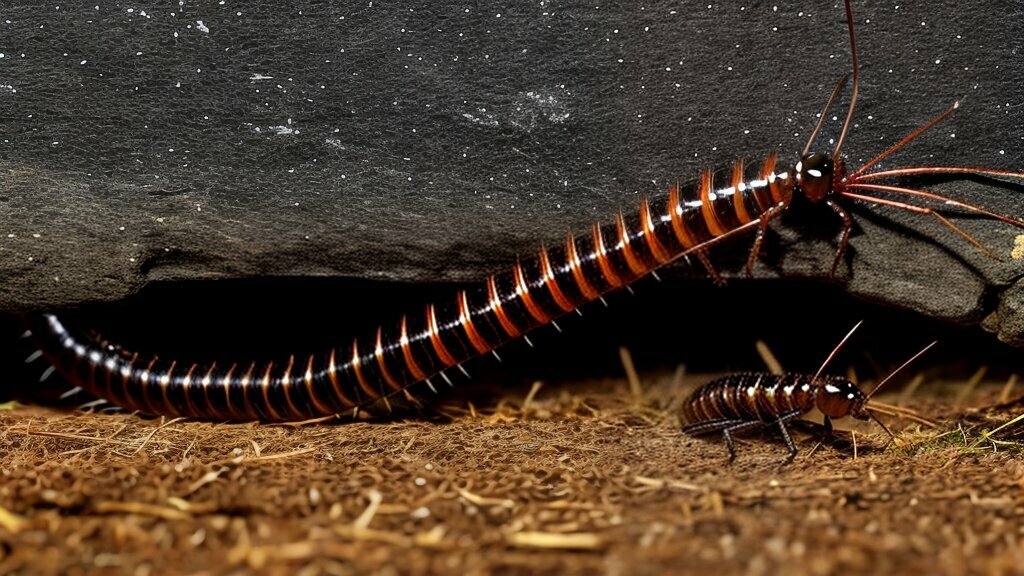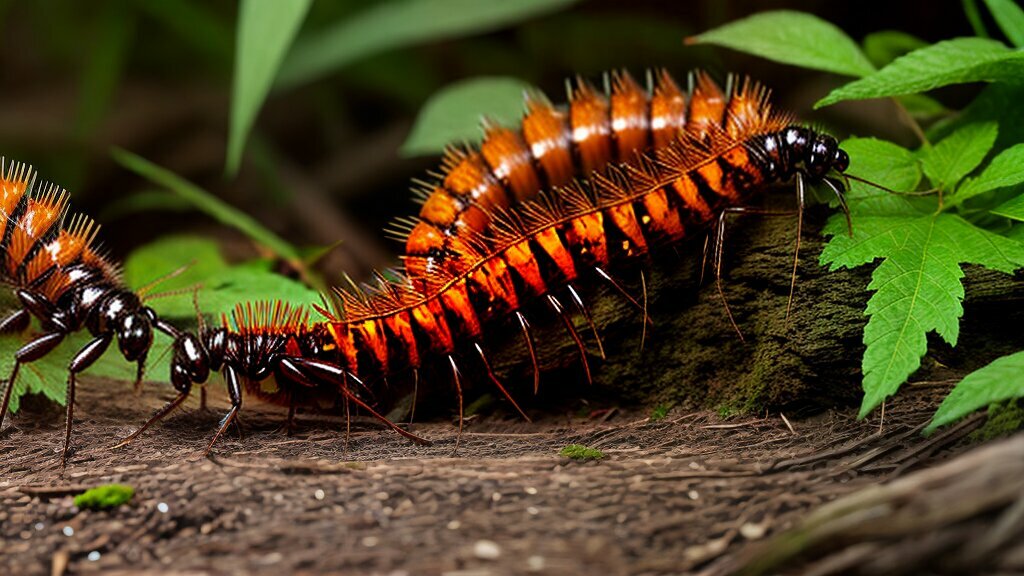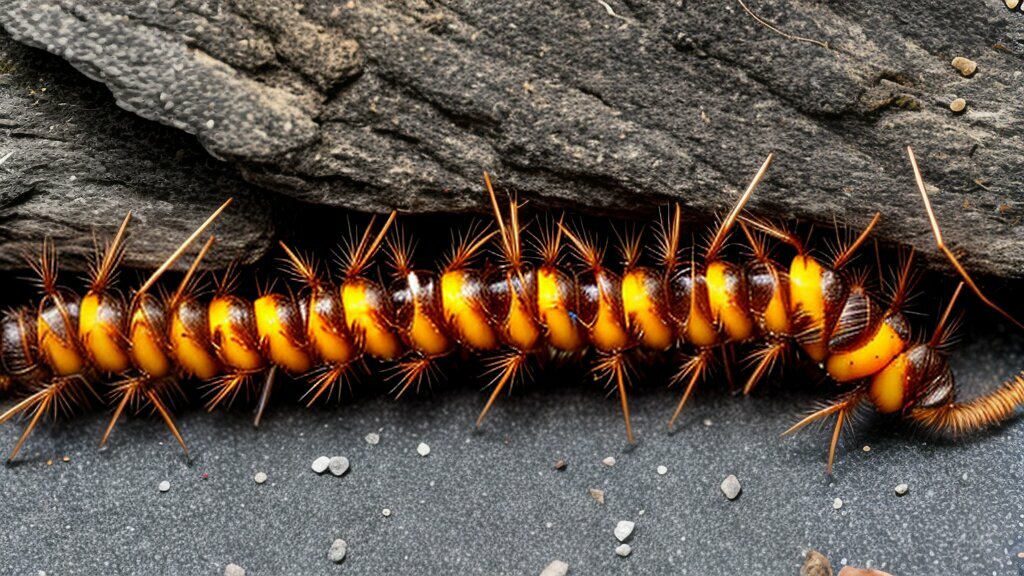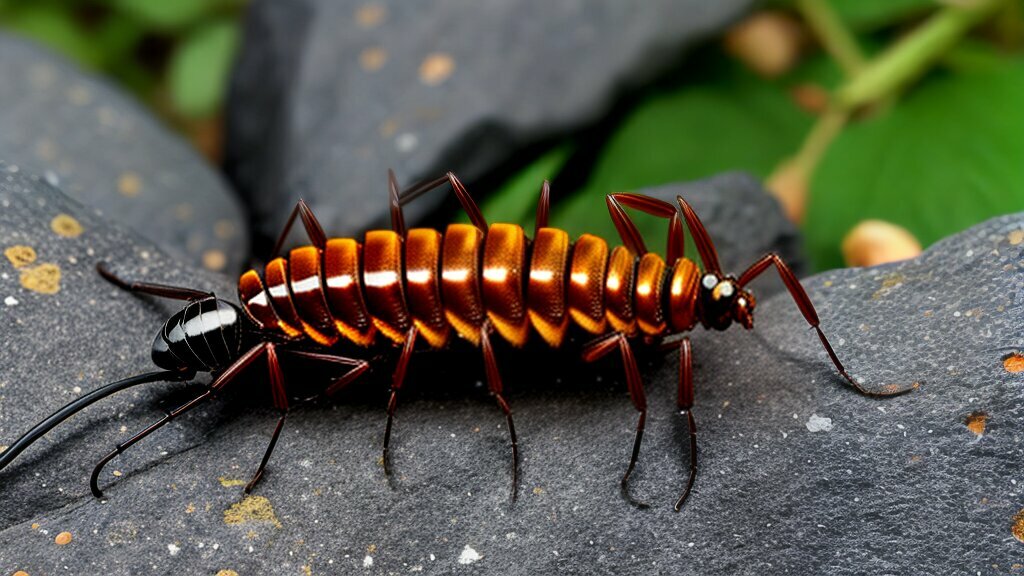Centipedes are fascinating creatures known for their many legs and creepy appearance. But what do we really know about their behavior and lifestyle? One question that often arises is whether centipedes are solitary or social creatures. In this article, we will delve deeper into the mysterious lifestyle of centipedes and explore their solitary nature.
Key Takeaways:
- Centipedes are typically solitary creatures that prefer to live alone.
- They establish territories and defend them against intruders.
Understanding Centipede Behavior
Centipedes are known for their solitary nature, preferring to live alone rather than in groups or communities. But why is this the case?
One reason for this behavior is their aggressive and territorial nature. Centipedes are predators, and they need ample space to hunt and feed without competition from other centipedes. They establish their territories and fiercely defend them, which is another reason why they prefer to live alone.
Furthermore, centipedes require specific environmental conditions to survive, such as moisture levels and temperature. Living alone allows centipedes to find and maintain the ideal habitat for their specific needs.
Interestingly, some species of centipedes have been observed exhibiting group behavior, but only under specific circumstances.
A study conducted by researchers at the University of Edinburgh found that certain centipedes may come together to mate, but once the mating process is complete, they go their separate ways. This temporary group behavior is purely for reproductive purposes and does not indicate a social or communal lifestyle.
Overall, the solitary nature of centipedes is a fundamental aspect of their behavior and plays a significant role in their survival and reproductive success.
The Living Habits of Centipedes
Centipedes are primarily solitary creatures that prefer to live alone. However, they do have specific living habits that contribute to their survival in the wild. One important aspect of their living habits is the establishment of territories.
Centipedes mark their territories with pheromones, a chemical substance that helps them communicate with other centipedes. These pheromones also help them identify their own territory and avoid areas that are already occupied by other centipedes.
| Living Habits | Details |
|---|---|
| Feeding | Centipedes are nocturnal hunters that feed on insects, spiders, and other small creatures. They have powerful jaws that enable them to inject venom into their prey. |
| Reproduction | Centipedes reproduce by laying eggs, which are typically deposited in soil or other protected areas. Some species of centipedes may have parental care, where the mother protects the eggs and young until they are able to fend for themselves. |
| Habitat | Centipedes prefer dark, damp environments such as under rocks, logs, and leaf litter. They may also be found in homes, particularly in basements, bathrooms, and other moist areas. |
It is important to note that while centipedes prefer to live alone, there are some instances where they may temporarily come together in groups. This is typically during the breeding season, when males will search for females in their territory.
Overall, the living habits of centipedes are fascinating and mysterious. Their ability to survive in a variety of environments, coupled with their solitary nature and territorial behavior, has made them a subject of interest for scientists and nature enthusiasts alike.
Group Behavior Among Centipedes
Although centipedes are typically solitary creatures, there have been rare instances of group behavior observed among certain species. These groups are generally comprised of juveniles who have yet to establish their own territories, or adult males during breeding season.
When juveniles cluster together, it is often for protection from predators and to ensure a stable food source. They may also engage in communal hunting, with each individual contributing to the capture and consumption of prey.
During breeding season, male centipedes may come together in groups to compete for mating opportunities with females. In some cases, males will engage in aggressive displays and physical combat to establish dominance and secure a mate.
“Although group behavior is not typical for centipedes, it is important to understand the circumstances under which it may occur. By studying these instances, researchers can gain insight into the social dynamics of these fascinating creatures.”
Centipedes and Isolation
Centipedes are known for their solitary nature, preferring to live alone rather than in groups or communities. This behavior may seem strange to humans, who tend to be social creatures, but it is an essential aspect of centipede survival.
Isolation allows centipedes to establish their territories and resources without competition from others. This is particularly important because centipedes are carnivorous and require a steady supply of prey to survive. By living alone, centipedes can ensure that they have access to enough food to thrive.
Centipedes are known for their solitary nature, preferring to live alone rather than in groups or communities.
Furthermore, centipedes are also highly aggressive towards other centipedes, particularly those of the same species. This aggression is likely due to competition for resources and mates. By living alone, centipedes can avoid these conflicts and reduce the risk of injury or death.
In addition to providing safety and resources, isolation also allows centipedes to engage in unique hunting strategies. For example, some centipedes will ambush their prey by burying themselves in soil or other debris and waiting for an unsuspecting victim to pass by. This technique requires patience and precision, which may be difficult to achieve in a group setting.
Benefits of Centipede Isolation
Overall, the solitary nature of centipedes has several benefits for their survival, including:
- Access to resources and food without competition
- Reduced risk of injury or death from conflicts with other centipedes
- Ability to engage in unique hunting strategies
While centipedes may seem mysterious and elusive, their preference for isolation is a key aspect of their behavior and essential to their survival.
Conclusion
In conclusion, centipedes are generally known for their solitary nature. They prefer to live alone and maintain their territories with utmost care. Their behavior is both fascinating and mysterious, and the reasons behind their preference for isolation remain a subject of research and debate among scientists.
Through the course of this article, we explored various aspects of centipede behavior and their living habits. We learned that they establish their territories and are extremely territorial. We also discovered that, while rare, centipedes may sometimes come together in groups.
The benefits of isolation for centipedes are immense, contributing significantly to their survival and well-being. They also exhibit certain biological and behavioral adaptations that allow them to thrive in their chosen habitats.
Overall, the lifestyle of centipedes is a fascinating subject of study, and we hope this article has shed some light on their solitary nature and unique living habits.
FAQ
Q: Are centipedes solitary?
A: Yes, centipedes are generally solitary creatures.
Q: What is the behavior of centipedes like?
A: Centipedes exhibit a solitary nature and prefer to live alone.
Q: What are the living habits of centipedes?
A: Centipedes have a preference for isolation and establish territories.
Q: Do centipedes ever exhibit group behavior?
A: While rare, there are instances where centipedes may temporarily come together in groups.
Q: Do centipedes prefer to be alone?
A: Yes, centipedes generally prefer to live alone and isolation benefits their survival.





